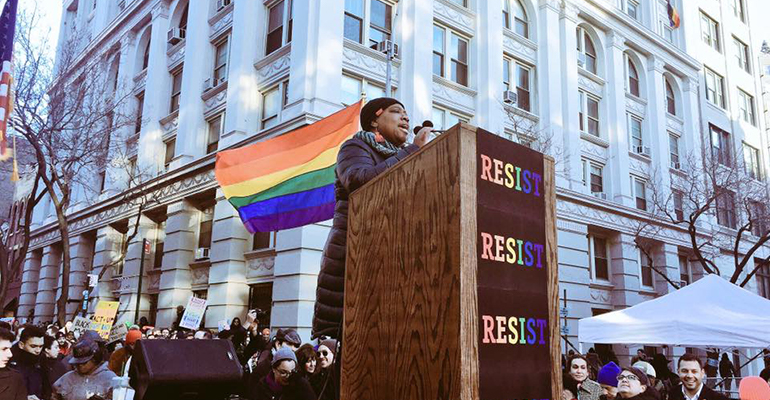
Last year, our country suffered the loss of 77 LGBTQ individuals to senseless hate violence. Most of these hate violence victims were people of color and many were transgender and gender nonconforming. One year ago today, on June 12, 2016, the Pulse Nightclub shooting in Orlando took the lives of 49 mostly Latinx LGBTQ young adults, wounded over 50 others and deeply traumatized hundreds. This massacre shook the LGBTQ community and our entire country to the core.
Along with 28 other LGBTQ hate-based homicides last year, the Pulse shooting made 2016 the deadliest year on record for hate violence against LGBTQ people in the United States. By June 11, 2016, the National Coalition of Anti-Violence Programs (NCAVP) had already responded to twelve hate-related homicides of LGBTQ people. Nine of those twelve victims were transgender women of color. The shooting at Pulse was deeply connected to the continuous hate violence being committed against LGBTQ people, and in particular LGBTQ people of color every day in this country.
Today, one year after the Pulse shooting, NCAVP is releasing its 20th annual report on LGBTQ and HIV-affected hate violence. For the 20th year in a row, we are calling the nation’s attention to the many ways hate—in the form of homophobia, transphobia and racism—can turn into violence against members of the LGBTQ community, especially those who are already marginalized, discriminated against and abused in our society.
The report, which analyzes 1,036 incidents of hate violence reported across the country, highlights that these homicides are occurring in a larger context in which anti-LGBTQ hate violence is persistent, daily and happening everywhere in our society. Hate violence is occurring at schools, workplaces, in our homes and communities. The majority of hate violence survivors experienced violence at the hands of someone they knew, not a stranger on the street. And in the current political climate in which attempts are being made to roll back or limit the rights and protections of LGBTQ people, already unsafe places are being made even more dangerous for our community members.
Last year, of the 28 non-Pulse hate violence homicides reported on in the 2016 NCAVP Hate Violence Report, 79% of the victims were people of color (18 Black and 4 were Latinx), 68% were transgender and gender nonconforming (TGNC) and 61% were transgender women of color.
Now, halfway through 2017, it is clear that we have not begun to turn the tide to end this cycle of violence. So far in 2017, NCAVP has received reports of 21 LGBTQ lives taken by possible hate-related violence, and the majority of these victims have been transgender, gender-nonconforming, and people of color.
Today, as we remember the Pulse shooting and celebrate the lives of those we lost in Orlando a year ago, let us also remember the other 28 LGBTQ lives lost to hate violence last year, and the 21 already lost in 2017.
As we lobby for gun reform, let’s also demand our elected officials stop dangerous religious exemption laws and other anti-LGBT legislation that contribute to a climate of hate and violence.
And when we attend vigils in the memory of Pulse, let’s also make a pledge to speak up when we hear anti-LGBTQ and anti-HIV hate speech or see people being targeted for who they are.
Let’s support community-based organizations that are working to prevent violence and find alternatives to systems that continue to criminalize and oppress our communities.
We still have a long way to go, but together, we can stand up for love and respect and make our world safer for everyone.
Beverly Tillery is the executive director of the New York City Ani-Violence Project. Follow her on Twitter: @BeverlyTillery
